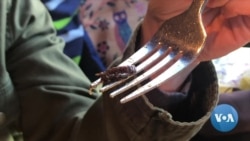It may sound sickening to some of you, but many people can and do eat insects.
Edible insects are a great source of high quality protein and minerals known to be important to good health, like calcium and iron. Insect larvae, or young, offer all that, as well high quality fat, which is good for brain development.
Insects are food in many parts of the world, but not in the United States. In the U.S., concerns about and even fear of the creatures mean serving insects as meals is extremely rare.
But that is starting to change.
Wendy Lu McGill is opening a shipping container in a community just outside Denver, Colorado. She steps into a little room that is lined with small white boxes. Machines keep the room’s temperature around 26 degrees Celsius. The relative humidity, or level of wetness in the air, is 80 percent. The conditions are just right for the extremely small creatures McGill is raising: mealworms.
"Rocky Mountain Micro Ranch is Colorado's first and only edible insect farm. We raise crickets and mealworms to sell to restaurants and food manufacturers."
The United Nations Food and Agricultural Organization has said that the world’s demand for protein from beef and even chicken is unsustainable. Protein from bugs is one possible solution.
McGill grows nearly 275 kilograms of insects every month. She feeds them crushed, wet grain. A carrot supplies their water needs. Each mealworm is about half the size of the smallest finger on a human hand. Thousands of the insects bend and move in each shallow container.
"I want to be part of trying to figure out how to feed ourselves better as we have less land and water and a hotter planet and more people to feed."
Visiting McGill’s Micro Ranch today are Terry Koelling and his grandchildren.
Andrew is almost five years old and Zora is nearly three. Like most Americans, they have never ever eaten a bug. They do not seem to want to try one now, either.
"I don't think they are very appealing, as far as something you put in your mouth. And you see them around dead things, and it just doesn't appeal to me to eat something that seems to be so wild."
Another visitor to the insect farm already likes the idea of using bugs as food.
"I'm Amy Franklin and I'm founder of a non-profit called Farms for Orphans. And what we do is farm bugs for food because in other countries where we work, they're a really, really popular food."
Franklin works in the Democratic Republic of Congo. In its markets, people sell live wild-caught crickets and African Palm weevil larvae to eat. These wild insects are only plentiful seasonally.
Franklin says some Congolese orphanages grow African Palm weevil larvae year round in shipping containers.
"Most of the orphanages don't own any land. There really is no opportunity for them to grow a garden or to raise chickens. Insects are a protein source that they can grow in a very small space."
Andrew and Zora are still unsure. To get them a little more used to the idea of insect protein, McGill brings out a small container filled with mealworms that have been cooked and salted.
"Can I just taste one?"
"Yeah! One. Totally. It's really crispy and salty."
"Tastes kind of crunchy and kind of yummy."
Bugs also taste yummy at Linger, a Denver restaurant where Sean Bruno prepares gourmet grubs.
Jeremy Kittleson is Linger’s food director. He says the restaurant is working to change American food interests.
"As much as we love beef, there's no scientist, there's no environmentalist that's gonna tell you cattle farming is a sustainable practice. We should eat more insects."
As his grandchildren watch disbelievingly, Koelling tries the Cricket Soba Noodle Dish. With a surprised look of pleasure, he says he likes the crickets.
"Kind of like a hard raisin. The seasoning's great! Huh. I'm kinda surprised."
Amy Franklin gives a toast with a forkful of noodles and crickets.
"Bug Appetit."
I'm Caty Weaver.
Shelley Schlender wrote this story for VOA News. Caty Weaver adapted it for Learning English. George Grow was the editor.
Write to us in the Comments Section or on our Facebook page.
_____________________________________________________________
Words in This Story





